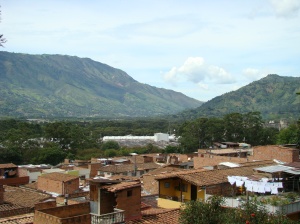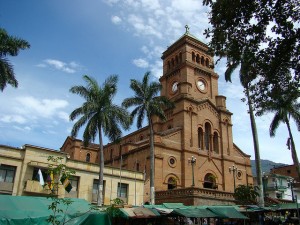My grandmother is a tough woman – tougher than I’ll ever be. I, for one, do not envy her having had to raise five kids on an elementary school teacher’s salary in 1970’s-1980’s Colombia. Nor is it fun to imagine that she did this because her husband was a philandering and often abusive man, who left the family in pursuit of other carnal pleasures. It’s important to note that from her five kids, only three remain, as the other two met unfortunate deaths at the hands of the banal violence and degenerate street culture that so plagued Colombia in its not-so-distant past.
And yet, despite the admittedly hard life which she had, her faith in God and in the catholic religion never wavered. This may be due to the oft-stereotyped “simple” nature of someone with limited education, but I refuse to believe such a simple characterization could include my grandmother. A person who eschews the archetype of the sweet, frail old woman and is often a larger than life character who walks around her native town with her head held high. She has a grace that can only be ascribed to someone whom the entire town not-so-affectionately, but ever so respectfully calls la profe (the teacher). She may not have a college degree, but what she does have is over 40 years’ experience of educating generations of the town’s elementary school children. Children that have become fathers, mothers, professors, lawyers, high school dropouts, criminals, businessmen, and everything in between. Yet they still always kindly look down, almost child-like, and remember the tough teacher that encompassed their formative years.
It is these experiences that always surprise: the humility with which people approach my grandmother, the way they infantilize themselves upon talking to her, or shamefully admit their shortcomings or successes. This fiercely independent woman is the town’s educational matriarch and continues to be revered as such. In fact, her legacy is often reflected in me, the only male grandchild, who, in a typically patriarchal culture, paradoxically represents the matriarchal branch of the family. After all, a single woman raised five kids, one of whom was a woman, and who then raised the only male descendant in the extended family. For this reason, my grandmother has always spoken to me at great lengths about the life lessons she has learned and has always tried to impart a certain wisdom to me.
I tended to dismiss these things in the past as they were often attached to a religious connotation and I had given up on organized religion around puberty. However, I called her last week. We spoke for two hours on the phone and she told me that hearing my voice made her week so much better. She spoke for a while about her sister’s death, the youth of the town, the children of those kids that one day she had educated, and just the recent passing of her closest friends. I was wary about how this would undoubtedly branch out into religion.
Of course it did, but in retrospect I’m glad it did. I was truly moved by the things she told me and just her outlook on life. For the first time, I was not ashamed of the catholic traditions and beliefs that underpinned my culture. I may not like organized religion, but I sure do like my grandmother’s religion.
She told me about a conversation she had with a couple of teenagers after visiting one of her old friends. They spoke about condoms, God, Pope Francis, homosexuality, family problems, abortion and all of the typically problematic religious/modernity issues. I found her point of view refreshing and I was shocked to hear her liberal stances on these topics. So much so that I told her this and she calmly responded with a simple phrase :
I’m an educator. If I’m not progressive, then how can we hope for a better future?
Perhaps, this is a sentiment that she should share with my mother, whose views seem draconian in comparison. She then told me that the only things she believes in is God and Love and that though she may go to church and commune with the organization, she only lives by what she knows is right and that it is not her place to hate or judge anyone.
It was an unexpected point of view coming from someone raised in and living in the most conservative department of Colombia. Though it may not revolutionary to whomever may be reading this, it was to me. I wrote this post not as a deeply theological or even pseudo-theological reflection on religion and love. Rather, it is a simple homage to my lovely grandmother, who despite her diabetes and chain-smoking, I hope lives for many decades more and whose company I may continue to enjoy. She is after all, quite taciturnly and quite remarkably, a total bad-ass.
Harold Alexander Mesa (Staff Writer, Rutgers University)Harold Mesa is a Rutgers University alumnus who received his B.A. in 2013 in History. He was born in Medellín, Colombia and lived the second half of his childhood in New Jersey. His interests include post-colonialism, linguistics, Marxian political thought, feminism, and Buddhism—amongst other things. He enjoys playing and discussing soccer.


¡Hola! Fue un placer leer tu post. Gracias. Reconozco muchas cosas. He estado en Girardota (si es que hablas de Antioquia?) y concozco gente pero sobre todo muchas historias de allí. Las mujeres ‘maduras’ de allí parecen ser muy especiales. Sería interesante ‘investigar’ por qué, qué condiciones sociales hubo (?). Tienen una mezcla misteriosa de religión conservadora con flexibilidad filosófica, fuerza y disciplina ética con sabiduría práctica y mucho humor. Pueden ser muy religiosas pero no son dogmáticas, ni aburridas. Fuman o toman sus guaritos, pueden parecer un poco reservadas pero son súper cariñosas y generosas en su forma de actuar. No sé, te hablo de mi experiencia y en base de lo que me contaron, pero, cuando leo sobre tu abuela me suena tanto!!! Te felicito por esa abuela tan preciosa.
LikeLike
Hola — Qué bueno que te haya gustado mi artículo y aprecio mucho tus comentarios! Y claro que estoy hablando de Antioquia, mi tierra natal. También debo de subrayar que mi abuela solo es una mujer entre muchas que también les ha tocado una vida difícil—innumerable mujeres que han forjado a Antioquia y a toda América Latina con su fuerza y espíritu triunfador. Y honestamente no se que mas decir porque la descripción y caracterización que das en tu comentario es la esencia de mi articulo. Solo le agradezco por tomar el tiempo de leerlo y de reflexionar críticamente sobre el, sea esto también desde una perspectiva anecdótica. Estoy feliz que usted haya disfrutado lo que escribí y le mando un sincero y grato saludo.
LikeLike
Pingback: Why we Need the Freedom Not to Believe: Lessons from China | Applied Sentience·
Pingback: The Failure of Liberation Theology: A Short Retrospective | Applied Sentience·
Pingback: The Contradiction of Awe | Applied Sentience·